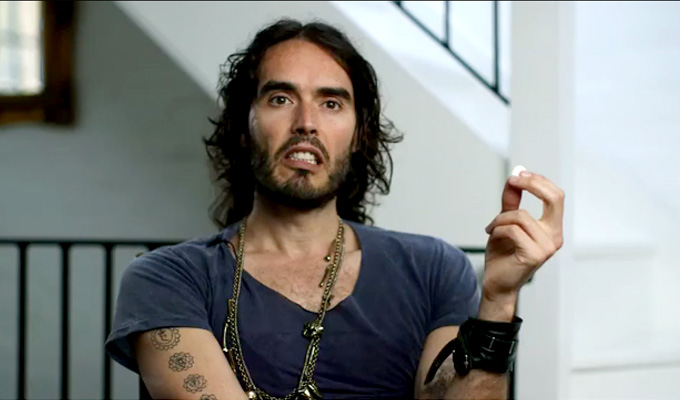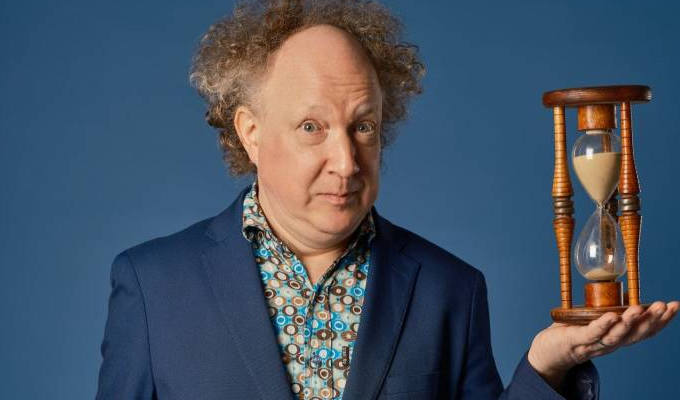
Russell Brand: The Emperor’s New Clothes
Note: This review is from 2015
Movie review by Jay Richardson
Russell Brand opens his new film, The Emperor’s New Clothes, reading Hans Christian Andersen’s short story across footage of The Lord Mayor’s Show in London, with all its ridiculous pomp and regressive ceremony.
Last night, following the premiere of the inequality-focused documentary, he concluded a live question and answer session, babbling meaningless nonsense at Brian May.
Glibly concluding ‘another one bites the dust’, after the Queen guitarist surprisingly took the mic to ask for concrete solutions to problems highlighted in the film, the comic gave him nothing for his pains.
As an encapsulation of the appeal and maddening irritation of Brand, it was perfect.
Under the guidance of director Michael Winterbottom, the comedian-turned-activist confirms himself as a compelling documentary-maker, his common touch eliciting moving testimony from victims of austerity, while his willingness to cock a snook at the Establishment presents a clear-eyed, compassionate and comprehensive articulation of the widening gap between rich and poor since 2008’s financial crash.
Throughout the film, his egotistical prancing and faux-Dickensian verbosity is kept to a minimum. And for those of a certain political persuasion, it really stokes fury at a financial system gamed towards the 1 per cent.
Sadly, then came the Q & A, broadcast live to 200 cinemas from the Hackney Picturehouse. Here Brand was revealed as the Emperor and May, inadvertently, as the little boy who emboldens everyone else to see the lack of substance. A series of questions from within the East London cinema and from Twitter found the comic reclining louchely in his seat, head lolling in a look of disengagement, promising a series of initiatives that were never expanded upon to members of organisations like Oxfam, the Fire Brigades Union and NHS. They had to content themselves with publicising their causes, because he had nothing useful to impart.
Despite this urgent, topical film being scrambled together shortly before the General Election, jamming in updates to bankers’ bonuses since the initial footage was shot, he sidestepped a predictable question about his much-publicised unwillingness to vote by saying that Winterbottom’s views run contrary to his own non-engagement.
As he lapsed into a familiar pattern of vague, quasi-mystical Utopianism and soundbite, only narrowly avoiding his usual refrain of ‘paradigm shift’, the contrast with his direct, concise address in the film was horribly marked. And I can’t have been alone in wanting to hear more from the more measured, thoughtful Winterbottom at his side.
But it was May’s intervention that truly threw a spanner in the Revolution. A patently decent man, promoting his Common Decency project to clean up politics, the rock star reckons he might be able to change Brand’s mind about voting.
For now though, he wants leadership, imploring the extoller of Guevara and Gandhi: ‘If you really don’t want to vote and you don’t want us to vote, what do you want us to do to achieve the things that we know we need to do because we just watched your film. What do you want us to do?’
To which Brand replied: ‘Did you put Freddie Mercury under this kind of fucking pressure? It’s a long-term strategy of the re-centralisation of the power under the co-ordination of vital institutions and vital services fully autonomous collectives that collaborate to preserve the rights of the individual and the rights to pursue spiritually whatever direction we want to with the prioritisation of the ecological preservation of the planet. It’s going to take a while for it to get on the ballot box but I don’t know if that is necessarily the right way to go about it but I support you, what I support most of all is people becoming fully activated and I’d be very, very happy to talk to you and Anita Dobson in your caravan.’
The awkwardness of May’s rictus grin as he grasped the vacuity of Brand’s rhetoric was painful to watch. Nevertheless, he persisted. ‘But what do we do Russell?’
To which Brand responded: ‘I mean, look, you know me, help me out. In that film that we grafted over there are loads and loads of ideas. You’re saying how do we get that shit to happen. I mean don’t make me say something mad on the telly. I believe in creating different relationships with powerful institutions which operate on behalf of the powerful, bringing them on to our side. I don’t agree with remaining within the parameters that have been set for us. I don’t believe in that in any level, I believe in real change. Like if an election is us the people we can have one whenever we fucking want, we can do whatever we like. I have some ideas, I have some strategies but I also have really serious limitations. I’m here to amplify the issues for the people in this room to help people in any way I can’.
To claim that this was a let-down after an excellent film is something of an understatement.
Revisiting his hometown of Grays in Essex repeatedly during the film, Brand lays the blame for its decline squarely at the feet of Thatcher, Reagan and their free market fundamentalism.
He spoke to those struggling with the bedroom tax, students saddled with debt, tenants facing eviction and cleaners scraping by on pittance wages, contrasting their experiences with the bank bosses and CEOs hiding behind security in their gleaming towers of steel and glass in London and New York. The comic mischievously scales the scaffolding of non-dom Daily Mail owner Lord Rothermere’s residence to erect a poster demanding the press baron pay his taxes, as Winterbottom adroitly balances journalism with Brand’s frivolity.
A series of economics, tax and banking experts armed with persuasive metaphors and damning statistics add authority. But credit has to go to Brand for distilling so many difficult and potentially boring issues into an easy-to-follow feature. As he says himself at the top of the film, we already know all this. But it’s still an achievement to join up all the symptoms of inequality in such an accessible package.
Even as one of the self-acknowledged rich, his desire for change is beyond reproach, as the now celibate lothario declares: ‘If you aren’t angry enough to kick a pig into a ditch, you’ve not been listening’.
Unfortunately, while he’s accomplished at highlighting the problems, his performance in the question and answer session makes you seriously question if he has any answers at all.
Review date: 22 Apr 2015
Reviewed by: Steve Bennett






